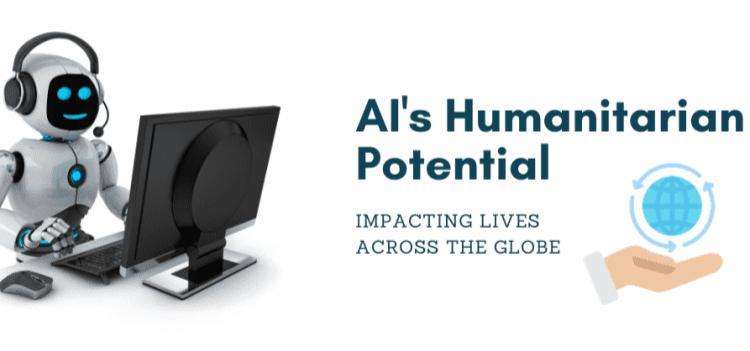
Artificial intelligence (AI) is not only transforming the way we work, learn, and communicate, but also the way we live.
For people with disabilities, AI can offer new possibilities and opportunities to overcome the challenges they face every day.
In this article, we will explore how AI is improving the quality of life for people with disabilities, and what are some of the current and future applications of this technology.
What is AI and how does it work?
AI is a broad term that refers to the ability of machines or software to perform tasks that normally require human intelligence, such as reasoning, learning, decision making, and problem solving.
AI can be divided into two categories: narrow AI and general AI.
Narrow AI is focused on specific tasks or domains, such as speech recognition, image recognition, or natural language processing.
General AI is the hypothetical ability of machines to perform any intellectual task that humans can do, such as understanding emotions, creativity, or common sense.
AI works by using algorithms, which are sets of rules or instructions that tell the machine how to process data and perform tasks.
AI algorithms can be based on different methods, such as logic, statistics, or neural networks.
Neural networks are inspired by the structure and function of the human brain, and consist of layers of interconnected nodes that process information and learn from data.
Neural networks are often used for deep learning, which is a subset of machine learning that involves learning from large amounts of data without human supervision.
How is AI helping people with disabilities?
AI can help people with disabilities in various ways, such as enhancing their abilities, providing assistance, or increasing accessibility.
Here are some examples of how AI is helping people with disabilities:
- Enhancing abilities:
AI can augment the capabilities of people with disabilities by providing them with tools or devices that can compensate for their impairments or enhance their skills.
For example, AI can help people with visual impairments by using computer vision to recognize objects, faces, or text, and provide audio feedback.
AI can also help people with hearing impairments by using speech recognition to transcribe speech to text, or by using natural language processing to translate sign language to speech.
AI can also help people with cognitive impairments by using natural language processing to simplify complex texts, or by using machine learning to provide personalized learning and support.
- Providing assistance:
AI can assist people with disabilities by performing tasks that they cannot do or have difficulty doing, or by providing them with information or guidance.
For example, AI can help people with mobility impairments by using robotics to create prosthetic limbs, exoskeletons, or wheelchairs that can adapt to the environment and user’s preferences.
AI can also help people with communication impairments by using natural language processing to generate speech or text from brain signals, or by using machine learning to create synthetic voices that match the user’s personality and emotions.
AI can also help people with mental health issues by using natural language processing to provide therapy or counselling, or by using machine learning to detect and monitor mood or stress levels.
- Increasing accessibility:
AI can make the world more accessible for people with disabilities by removing barriers or creating opportunities.
For example, AI can help people with disabilities access information or services by using natural language processing to create chatbots or voice assistants that can answer questions, provide recommendations, or complete tasks.
AI can also help people with disabilities participate in social or professional activities by using natural language processing to create captions or subtitles for videos, or by using machine learning to create avatars or holograms that can represent them in virtual or augmented reality.
The current and future applications of AI for people with disabilities.
AI is already being used for various applications that can benefit people with disabilities, and there are many more possibilities for the future.
Here are some of the current and future applications of AI for people with disabilities:
1. Seeing AI:
Seeing AI is an app developed by Microsoft that uses AI to help people with visual impairments.
The app uses the camera of a smartphone or a wearable device to scan the surroundings and provide audio descriptions of what it sees, such as people, objects, colors, text, or currency.
The app can also recognize faces and emotions, read documents or barcodes, and identify products or scenes. The app is available for free on iOS and Android devices.
2. Project Euphonia:
Project Euphonia is a research project by Google that uses AI to help people with speech impairments.
The project aims to improve speech recognition for people who have difficulty speaking due to conditions such as ALS, Parkinson’s, or stroke.
The project uses deep learning to train speech models on the voices of people with speech impairments, and to generate synthetic speech that sounds natural and intelligible.
The project also uses natural language processing to create personalized dictionaries and phrases that match the user’s vocabulary and context.
3. BrainGate:
BrainGate is a research project that uses AI to help people with paralysis. The project uses a brain-computer interface (BCI) that consists of a small implant that records the electrical activity of the brain, and a computer that decodes the signals and translates them into commands for external devices.
The project uses machine learning to calibrate the BCI to the user’s intentions and preferences, and to improve the accuracy and speed of the communication.
The project has enabled people with paralysis to control robotic arms, computer cursors, or keyboards using their thoughts.
4. AI for Accessibility:
AI for Accessibility is a program by Microsoft that supports and funds projects that use AI to empower people with disabilities.
The program focuses on three areas: employment, daily life, and communication and connection.
The program provides grants, technology, and expertise to individuals, organizations, or start-ups that have innovative ideas or solutions that can improve the lives of people with disabilities.
Some of the projects that have been supported by the program include:
- InnerVoice: InnerVoice is an app that uses AI to help people with autism or other communication disorders. The app uses natural language processing to create personalized avatars that can speak or sign for the user, or to teach the user how to communicate using facial expressions, gestures, or emotions. The app also uses machine learning to analyze the user’s speech and provide feedback or suggestions.
- Helpicto: Helpicto is an app that uses AI to help people with intellectual disabilities or learning difficulties. The app uses natural language processing to convert speech or text to pictograms, or vice versa, to facilitate communication and understanding. The app also uses machine learning to adapt to the user’s level and needs, and to provide recommendations or reminders.
- SeeingVR: SeeingVR is a toolkit that uses AI to make virtual reality more accessible for people with low vision. The toolkit consists of 14 tools that can enhance the visual quality, contrast, or size of the VR content, or provide audio or haptic feedback. The toolkit also uses machine learning to optimize the VR settings for each user and scenario.
Conclusion
AI is a powerful and promising technology that can improve the quality of life for people with disabilities. AI can enhance their abilities, provide assistance, or increase accessibility, and open up new possibilities and opportunities for them.
AI can also create more inclusive and diverse societies, where people with disabilities can participate and contribute fully.
However, AI also poses some challenges and risks, such as ethical, social, or legal issues, that need to be addressed and resolved.
Therefore, it is important to involve people with disabilities in the design, development, and evaluation of AI systems, and to ensure that AI is used for good and not evil.
RELATED ARTICLES
- The challenges and opportunities of using AI for environmental sustainability
- The best AI courses and certifications to boost your career (Free & Paid)
- The difference between AI, machine learning, and deep learning
- The 10 Artificial intelligence Amazing Examples and Success Stories from Various Industries
- The best AI resources and communities for learning and networking










Наш сайт эротических рассказов https://shoptop.org/ поможет тебе отвлечься от повседневной суеты и погрузиться в мир страсти и эмоций. Богатая библиотека секс историй для взрослых пробудит твое воображение и позволит насладиться каждой строкой.
anosondy https://mikrocz.cz/
купить микронаушники микронаушник Прага
https://proauto.kyiv.ua здесь вы найдете обзоры и тест-драйвы автомобилей, свежие новости автопрома, обширный автокаталог с характеристиками и ценами, полезные советы по уходу и ремонту, а также активное сообщество автолюбителей. Присоединяйтесь к нам и оставайтесь в курсе всех событий в мире автомобилей!
https://autoclub.kyiv.ua узнайте все о новых моделях, читайте обзоры и тест-драйвы, получайте советы по уходу за авто и ремонтам. Наш автокаталог и активное сообщество автолюбителей помогут вам быть в курсе последних тенденций.
Founded in Texas in 2002, https://southeast.newschannelnebraska.com/story/50826769/del-mar-energy-from-humble-beginnings-to-an-energy-market-leader quickly transformed into one of the leading players in the energy market, oil and gas extraction, road construction
gates of olympus слот [url=http://www.gates-of-olympus-ru.ru]gates of olympus слот[/url] .
seo аудит сайта стоимость [url=www.prodvizhenie-sajtov-v-moskve113.ru]www.prodvizhenie-sajtov-v-moskve113.ru[/url] .
как пожаловаться на мошенников [url=www.pozhalovatsya-na-moshennikov.ru/]как пожаловаться на мошенников[/url] .
анал русских с разговорами смотреть бесплатно https://safavia.ru .
вскрытие замков московская [url=http://vskrytie-zamkov-moskva113.ru]вскрытие замков московская[/url] .
продвижение сайтов в москве недорого в топ [url=http://prodvizhenie-sajtov-v-moskve117.ru/]http://prodvizhenie-sajtov-v-moskve117.ru/[/url] .
Профессиональные seo https://seo-optimizaciya-kazan.ru услуги для максимизации онлайн-видимости вашего бизнеса. Наши эксперты проведут глубокий анализ сайта, оптимизируют контент и структуру, улучшат технические аспекты и разработают индивидуальные стратегии продвижения.